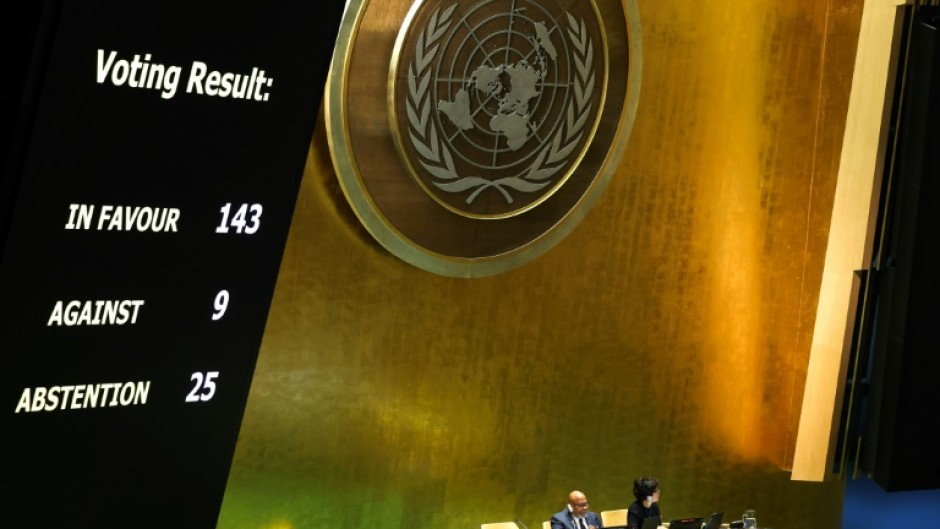The United Nations General Assembly voted overwhelmingly on Friday to grant the Palestinians some additional rights in the global body, after their drive for full membership was blocked by the United States.
"I have stood hundreds of times before at this podium, but never for a more significant vote than the one about to take place, an historic one," Palestinian ambassador to the UN Riyad Mansour said before the vote, his voice full of emotion.
He added, "The day will come where Palestine will take its rightful place among the community of free nations."
Israel reacted angrily, with its UN ambassador, Gilad Erdan, saying the resolution made him sick.
"With this new precedent, we may see here representatives of ISIS or Boko Haram that will sit among us," Erdan said, referring to two jihadist groups. He said it would give "the rights of a state to an entity that is already partly controlled by terrorists, and will be replaced by a force of child-murdering Hamas rapists."
US deputy ambassador to the UN Robert Wood called the resolution "an unproductive text."
While "our vote does not reflect opposition to Palestinian statehood," Wood said after the resolution passed, "it remains the US view that unilateral measures at the UN and on the ground will not advance this goal."
With the war in Gaza raging, the Palestinians in April relaunched a request dating back to 2011 to become full members of the United Nations, where their current status is that of a "nonmember observer state."
To succeed, the initiative needed a Security Council green light and then a two-thirds majority vote in the General Assembly.
But the United States -- one of five veto-holding members on the Security Council and Israel's closest ally -- blocked it on April 18.
The resolution, introduced by the United Arab Emirates, says, "The State of Palestine is qualified for membership in the United Nations in accordance with Article 4 of the Charter and should therefore be admitted."
It calls on the Security Council to "reconsider the matter favorably."
The United States, however, opposes any recognition of statehood outside of a bilateral accord between the Palestinians and Israel, whose current right-wing government is adamantly opposed to a two-state solution.
While the passing of the resolution will "have a profound impact on the future of the Palestinian people," said UAE Ambassador Mohamed Issa Abushahab, it "does not do justice to the state of Palestine, as it only grants additional rights, meaning that Palestine will remain an observer state."
Richard Gowan, an analyst with the International Crisis Group, said the move could create "a sort of diplomatic doom loop, with the Assembly repeatedly calling for the Council to grant Palestine membership and the US vetoing it."
The draft resolution nonetheless gives the Palestinians certain "additional rights and privileges" starting in the next session of the General Assembly, in September.
- 'Symbolism is what matters' -
The text explicitly rules out letting the Palestinians be chosen to sit on the Security Council or to vote in the General Assembly.
But it lets them submit proposals and amendments directly, without having to go through another country, as is the case now.
It also gives them the right to be seated among member states in alphabetical order.
"The symbolism is what matters," said Gowan. "This resolution is a very clear signal to Israel and the US that it is time to take Palestinian statehood seriously."
As Israel presses on with its war in Gaza against Hamas in response to the October 7 attack, the UN vote allows the Palestinians to gauge support from other countries.
In December, 153 countries out of 193 backed a call for an immediate ceasefire in the Gaza war. Ten voted against, including the United States, while 23 abstained.
By Amélie Bottollier-depois

